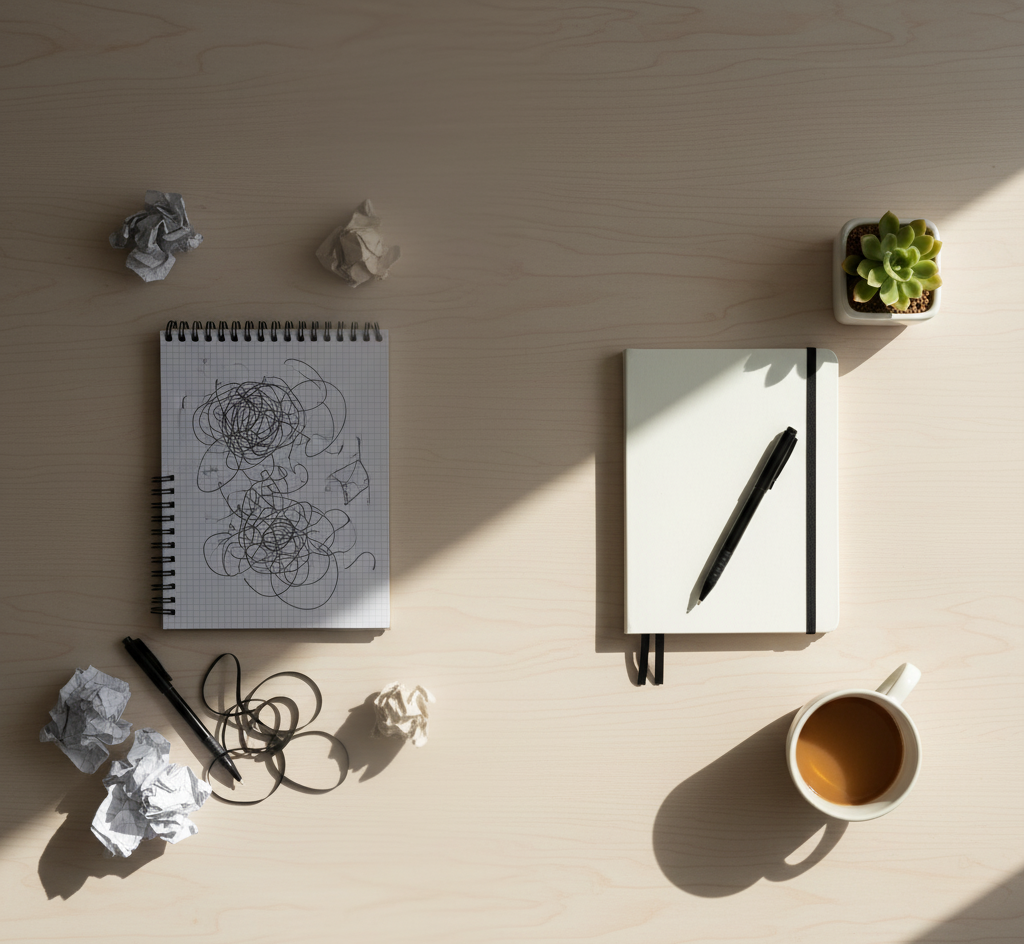Have you ever finished a long workday, checked everything off your list, and still felt like you accomplished… nothing meaningful? You’re not alone. Modern productivity has become less about peace of mind and more about keeping up with a culture that worships busyness.
I used to think the key to getting more done was simply “working harder.” Then I realized that most of what I believed about productivity was rooted in myths — comforting but misleading stories that keep us spinning in circles instead of moving forward.
This article unpacks seven common productivity lies — and what actually works instead. If you’ve ever felt guilty for not doing “enough,” this one’s for you.
📘 Part of the Foundations Series: This guide belongs to the core principles of mindful productivity. Start with the full framework here → Foundations of Mindful Productivity .
1. Lie #1: More Hours = More Results
We’ve been told that productivity is about squeezing more hours into the day. But the truth? Longer hours don’t equal better output — they usually equal burnout.
Why This Lie Persists
Culturally, we equate time spent with dedication. We praise the “grind,” assuming fatigue is a badge of honor. But the brain doesn’t work that way. After a certain point, focus drops, creativity fades, and mistakes multiply.
What’s Actually True
Productivity isn’t about time management — it’s about energy management.
- Schedule your hardest tasks when your energy peaks (usually mid-morning).
- Protect focus blocks with no notifications or meetings.
- Build recovery time — a short walk, deep breaths, or a quiet lunch.
I used to power through eight-hour stretches of writing. Now, I work in 90-minute focus blocks, then step away. The result? Better work, less stress, and no caffeine crashes.
Key takeaway: Working longer is easy. Working smarter — that’s mastery.
2. Lie #2: Productivity Is About Doing More
There’s this subtle but dangerous belief that “being productive” means constantly adding — more goals, more habits, more systems. But true productivity is subtraction.
When you remove distractions, excess tools, and meaningless tasks, you create space for clarity and flow.
Try This Instead
- Audit your week. Identify 3 tasks that drain your energy but don’t move the needle.
- Ask, “What would happen if I simply stopped doing this?”
- Focus on fewer, better projects — the ones that align with your real priorities.
When I simplified my workflow from five productivity apps to one (I now use Notion — a complete game changer), my creative energy doubled. Minimalism isn’t laziness — it’s precision.
Key takeaway: The less you do, the better you can do it.
3. Lie #3: Multitasking Makes You Efficient

You’ve probably heard that multitasking is a superpower — but neuroscience tells us the opposite. Switching between tasks actually reduces productivity by up to 40%.
The Science of “Context Switching”
Each time you shift focus (say, from an email to a design project), your brain must “reload” context. That cognitive reset drains energy and lowers performance.
What to Do Instead
- Batch similar tasks (emails, admin, creative work).
- Silence notifications during deep focus.
- Use single-task tools like Focusmate or Forest to reinforce presence.
When I began working in themed blocks — mornings for deep work, afternoons for meetings — I felt mentally lighter. No more “half-working” on everything and finishing nothing.
Key takeaway: Multitasking isn’t mastery — it’s mental ping-pong.
4. Lie #4: You Need Perfect Conditions to Focus
We tell ourselves, “I’ll start once things calm down.” The problem? Life rarely does. Waiting for perfect focus conditions often becomes a sophisticated form of procrastination.
The Myth of Ideal Environments
Yes, a clean workspace helps. But clarity comes from mental readiness, not mood lighting.
Try starting before you feel ready:
- Set a 2-minute timer and begin anyway. Momentum often follows action.
- Keep a “distraction notebook” nearby — jot down random thoughts, then return to work.
- Use gentle focus cues — like a candle, playlist, or cup of tea — to trigger flow.
Some of my most productive writing sessions happened on noisy trains, not in perfect silence. Turns out, focus is an internal skill, not an external condition.
Key takeaway: Don’t wait for calm to focus. Focus creates calm.
5. Lie #5: Success Comes from Hustle Alone
The word “hustle” once meant enthusiasm. Now it’s synonymous with exhaustion. The truth is, sustained productivity isn’t fueled by pressure — it’s powered by alignment.
When your goals connect to something meaningful, discipline feels natural, not forced.
The Reframe: Sustainable Drive
- Reconnect with your why. Ask: “What does meaningful success look like for me?”
- Redefine productivity as progress with peace.
- Remember that rest is part of the work — not its opposite.
After a burnout phase, I learned that slowing down didn’t mean falling behind. It meant coming back stronger, with direction.
Key takeaway: Productivity without purpose is just motion.
6. Lie #6: Tools Will Fix Everything
There’s always a new app promising to organize your chaos. But tools can’t fix unclear priorities. A system is only as strong as the clarity behind it.
Smart Tool Use
Use tools to support — not replace — focus.
- One note app for ideas (like Evernote or Notion).
- One calendar for commitments.
- One simple to-do list (Todoist or ClickUp).
When I stopped hopping between apps and committed to one integrated system, my workflow finally felt calm. Don’t collect productivity tools — craft a system that reflects how your mind works.
Key takeaway: Tools amplify clarity. They can’t create it.
7. Lie #7: You Must Be Productive All the Time

We often feel guilty when we’re not “on.” But rest isn’t the opposite of productivity — it’s the foundation of it.
Think about it: even elite athletes build recovery into training. Your brain works the same way. Constant output without recharge leads to diminishing returns.
Redefine Rest
- Schedule non-negotiable breaks.
- Let your mind wander — that’s where creativity blooms.
- Disconnect fully at least one day a week.
Some of my most original ideas arrive during walks, not while staring at screens. Productivity isn’t a constant sprint — it’s a rhythm between effort and ease.
Key takeaway: Real productivity honors both focus and flow — effort and rest.
Bonus Reflection: The Real Truth About Productivity
Productivity isn’t a moral scorecard or a measure of worth. It’s simply a tool — a way to shape your attention toward what matters.
When you let go of the lies, you stop performing efficiency and start living intentionally.
What if, instead of asking, “How much did I get done?” you asked, “Did I move closer to what matters today?”
That question changes everything.
Conclusion
You don’t need more hours, hustle, or apps. You need clarity, presence, and alignment.
True productivity isn’t about doing more — it’s about being more intentional with less.
Try one small shift this week: single-task, cut one meaningless to-do, or schedule real rest. Watch how your energy — and quality of work — transforms.
And if you’re ready to cultivate focus that feels calm, not frantic, check out our companion post:
Focus Like a Monk: Deep Work for Everyday People — your next step to creating flow and clarity.




